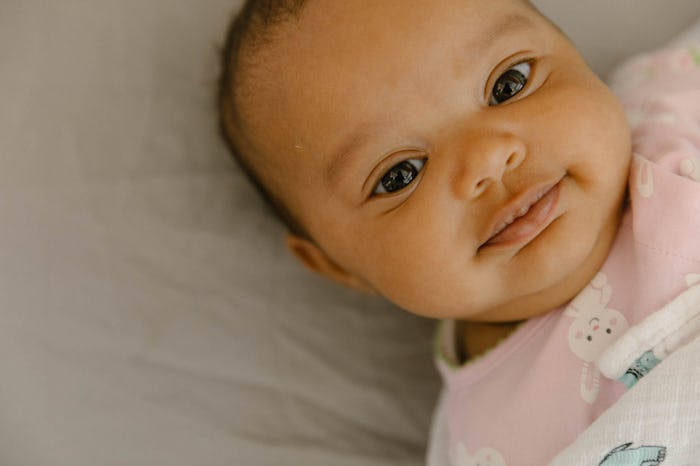Life
5 Signs Your Baby Needs To Sleep More Often, According To Experts
If you ask any new parent, they'll probably tell you that their little bundle of joy could use more sleep. I mean, babies aren't exactly known for sleeping well, and their parents are likely to suffer from at least a little sleep deprivation themselves. Thankfully, there are actually signs your baby needs to sleep more often — especially when it comes to their health, wellbeing, and your sanity — and things you can do to help your baby improve their quality of sleep.
According to the American Academy of Sleep Medicine, once a baby reaches 4 months of age, they should get at least 12 to 16 hours of sleep every day between naps and nighttime sleeping. In fact, according to a consensus statement published in the Journal of Clinical Sleep Medicine, not getting enough sleep can not only make your baby over-tired, but actually impact their short- and long-term health and emotional well being. Unfortunately, according to a survey conducted by the National Sleep Foundation, 29 percent of parents report that their babies sleep less than the doctor-recommended amount each day.
The good news is that if you are unsure about whether or not your baby is getting enough sleep, they will likely show you in a variety of ways. As Stanford Health notes on their website, babies who are overtired will rub their eyes, yawn, and generally appear sleepy. Or as mom and pediatrician Kathryn Bucklen, M.D. writes for childrensmd.org, they might get seriously crabby and over-stimulated. Helping your child get good rest during the day can improve their mood, health, and ability to fall asleep at night, too, according to the National Sleep Foundation. And once they get on the right track, everyone can get more sleep. Yes, including you.
For more about how to know if your baby isn't getting enough sleep, read on:
They Don't Get The Recommended Hours Of Sleep
According to a review of research published in the Journal of Clinical Sleep Medicine, once they reach about 4 months of age and until their first birthday, babies generally need to sleep a minimum of 12 to 16 hours every 24 hours — including night time sleep and naps during the day — to stay healthy and happy.
If your baby is not sleeping enough, you aren't alone. A survey done by the National Sleep Foundation found that about 29 percent of infants are not sleeping a minimum of 12 hours at night, which can can take its toll on those babies and their tired parents, too.
They Sleep Poorly At Night
According to the National Sleep Foundation not getting enough cumulative sleep each day can ironically make your baby sleep like crap. According to their national survey, babies who don't get enough sleep take longer to fall asleep, wake up more frequently at night or early in the morning, are more likely to have sleep disturbances, and are more likely to change sleep location (read: end up in their parents' room).
They Are Crabby AF
As Bucklen writes on childrensmd.org, babies who aren't getting enough sleep will easily get overstimulated and, as a result, are unable to wind down. Stanford health notes that sleep deprivation might also result in a seriously crabby baby. If your baby seems upset and inconsolable every damn evening, they might need more sleep.
They Get Sick All Of The Time
As Dr. Shalini Paruthi, M.D., adjunct associate professor in Pediatrics at Saint Louis University School of Medicine and director of the Pediatric Sleep and Research Center, writes for Sleep Review, sleep deprivation can actually impact your baby's health by interfering with their immune system's ability to fight disease. Illnesses can, in turn, disrupt their sleep.
They Seem Over-Tired
According to evolutionary anthropologist Gwen Dewar, Ph.D. on parentingscience.com, over-tired babies will generally let you know that they need more sleep. Younger babies might act "spacey" and disinterested in you or things around them, yawn, or pull at their ears. The same site notes that older babies might express over-tiredness by becoming clingy or even stumbling around.
To get your overtired baby in the mood for sleep, Bucklen suggests lowering lights, creating a calm environment, or even trying a swing or short drive to lull them into dreamland.
